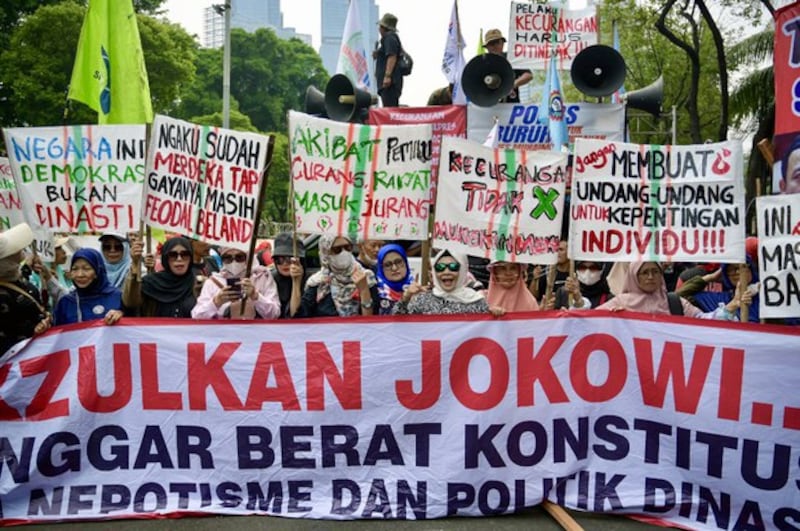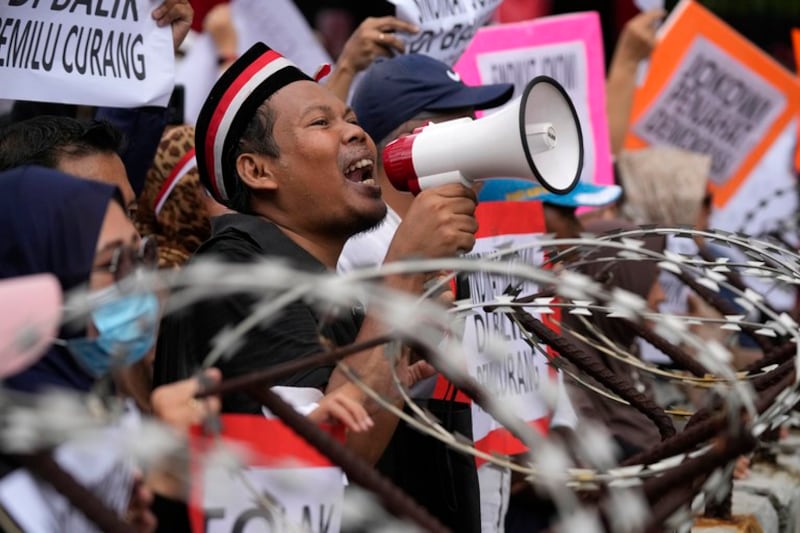Indonesia’s presidential and legislative elections this month were the worst since the country’s democratic transition, two watchdog groups have said, citing issues ranging from campaign finance to electoral fraud.
Indonesia Corruption Watch as well as KontraS, a human rights group, also accused outgoing President Joko “Jokowi” Widodo of meddling in the Feb. 14 presidential and legislative elections and showing favoritism toward the winning ticket, which featured his son.
The polls were marred by a lack of transparency, accountability and fairness, the watchdog groups said as they called for urgent reforms to prevent a further deterioration of the electoral system in Southeast Asia’s largest country, a 25-year-old democracy.
“We think it is reasonable for the public to question the election results, based on the process that is suspected to be fraudulent and problematic,” the groups said in a joint statement Friday.
“The failure of the General Elections Commission to carry out its responsibilities as an election organizer, and the dysfunctionality of the Election Supervisory Agency as an election monitor has led us to categorize the 2024 elections as the worst elections in the reform era.”
The end of President Suharto’s 32-year dictatorship in 1998 ushered in the so-called reform era.
Prabowo Subianto, a former army general and the current defense minister, won the presidential race with more than 57% of the vote, according to unofficial quick counts by reputable pollsters.
He defeated his rivals Anies Baswedan, the former governor of Jakarta, and former Central Java Gov. Ganjar Pranowo.
Prabowo, Suharto’s ex-son-in-law who ran with Jokowi’s son Gibran Rakabuming Raka as his vice-presidential candidate, claimed victory based on the quick counts, which have proven accurate in past elections. Jokowi is constitutionally barred from seeking a third term.

The watchdog groups said the election commission did not provide the public enough information on the source of campaign funds for the elections, thus raising concerns about influence-peddling.
The vote counting process was opaque and unreliable, undermining public trust in the results, they said.
KontraS and Indonesia Corruption Watch said they found 310 cases of alleged fraud involving election organizers, government officials, civil servants and candidates.
Cases included ones such as the mobilization of village heads to support the Prabowo-Gibran ticket, the tampering of ballots by polling station workers, and vote buying, the groups said.
And while violence was comparatively lower in this election compared with the previous one in 2019, they documented at least 18 incidents, including voter intimidation.
These incidents resulted in 80 injuries and four deaths, they said.
The two groups called on the commission to address these issues and take steps to improve the quality and integrity of future elections. They also urged the electoral supervisory board to rigorously investigate and prosecute any violations that occurred during the polls.
‘We never joke around’
Meanwhile, a parliamentary inquiry into the elections is in the works, as the main parties that backed the losing presidential candidates Ganjar and Anies agreed to join forces to probe alleged electoral fraud.
Adian Napitupulu, from Ganjar’s Indonesian Democratic Party of Struggle (PDI-P), the ruling party, said it was “ready” to start the inquiry after the parliament’s recess ends on March 5.
The parties said they would use their constitutional right to investigate how the election law and government policy were implemented, and whether they had violated any regulations.
“We are ready to roll out the inquiry with PDI-P as the initiator,” said a joint statement released by Anies’ coalition on Friday.
Ganjar also said he was serious about the inquiry.
“We never joke around or bluff,” Ganjar told reporters on Friday.
Jokowi has said that he did not mind the inquiry plan, saying: “That is a democratic right.”
A parliamentary inquiry can be initiated by at least 25 lawmakers and more than one coalition. It can also summon election officials and others to testify on the fraud claims.
On Feb. 16, Jokowi had a meeting with NasDem, one of the main parties in the coalition that supported Anies. Both the president and Anies played down the meeting, according to the local media, with Anies saying that the alliance still strongly backed him.

The National Mandate Party (PAN), a member of the alliance that backs Prabowo, said it opposed the idea of a parliamentary inquiry.
“Election disputes should follow the existing rules and mechanisms,” PAN leader Saleh Partaonan Daulay told the Media Indonesia newspaper on Sunday.
He said the Constitutional Court had always handled election result disputes in the past and all election candidates could file lawsuits there.
Indonesia’s parliament, though, has the power to investigate the government’s policies, its implementation of some regulations and public officials’ conduct, including the president’s, according to Reuters news agency.
Anies’ camp has alleged that the Prabowo team had used underhand tactics to gain a higher vote count.
The PDI-P has accused the Prabowo camp of resorting to legal manipulation, various forms of coercion, and abuse of state resources to gain an advantage in the contest.
Presumptive vice president Gibran, the mayor of Solo, benefited from a controversial ruling by the Constitutional Court in October that paved the way for him to contest for the number two post.
The court’s chief justice, Anwar Usman, who is married to Jokowi’s sister, was dismissed from his post in November for ethical violations linked to the ruling.
Jokowi was accused of using populist measures, such as handing out social aid early, and raising salaries for civil servants, police and the military, which critics said were aimed at boosting Prabowo’s chances.
The president refuted any manipulation of the judiciary or favoring a particular set of candidates.
Jokowi did not publicly endorse any of the candidates, but critics alleged that his administration had tampered with government materials and influenced the judiciary to ensure a victory for Prabowo and 36-year-old Gibran.
